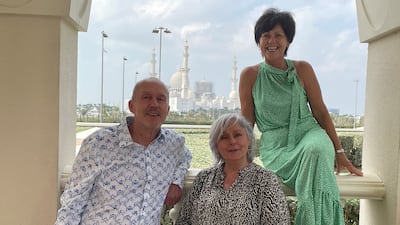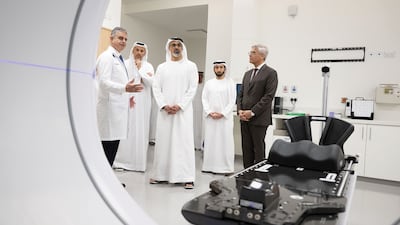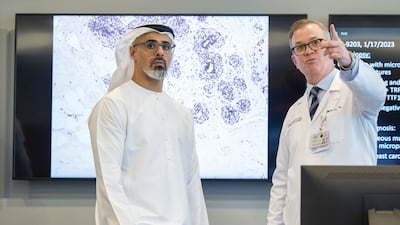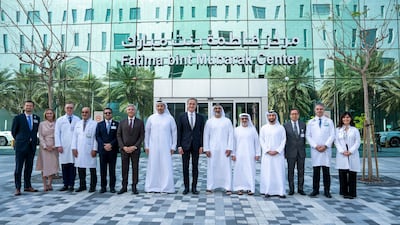An Abu Dhabi mathematics professor diagnosed with a rare form of blood cancer says he has been given new hope after receiving a stem cell transplant.
Neville Martin, 60, was told he had multiple myeloma, a condition characterised by a spread of abnormal plasma cells, last July.
Mr Martin, who has lived in the Emirates for 30 years, had been dogged by constant back pain before seeking medical support at Cleveland Clinic Abu Dhabi.
Bone pain is the most common symptom of the disease, with other signs including kidney problems, fatigue, nausea, and unexplained weight loss.
There remains no cure for multiple myeloma, but advances made in health care mean cutting-edge treatments can prolong the lives of patients by many years.
Rather than feeling defeated by the disease, Mr Martin is optimistic about what the future holds and feels lucky to receive top-class care in the capital.
“It is very easy to slip into negativity and I have no room for that. I am actually quite hopeful,” said Mr Martin, an avid golfer from Newcastle in the UK.
“Luckily, the science has moved so quickly that someone like me can look ahead and have many options – the science is quite interesting. It is actually incurable, but new options are developing all the time and I am in the best place in the world for that.
“I first came to the UAE with a plan to stay for two years and now it has been 30 years and I have no intention of going anywhere else.
“I am so lucky to be living in Abu Dhabi. I am 15 minutes away from Cleveland Clinic Abu Dhabi and getting the best treatment. I am feeling 10 times better than I did in 2022, when I was struggling in so many ways.”
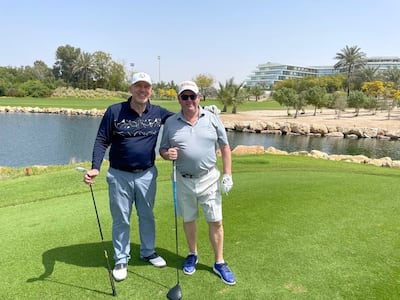
He had an autologous transplant at Cleveland Clinic Abu Dhabi in January, becoming the first person to undergo such a transplant procedure at the hospital.
It involves a patient's healthy stem cells being collected from blood or bone marrow, stored, and then used to replace abnormal stem cells which are killed through chemotherapy, radiation treatments or other methods such as a course of steroids.
Stem cell transplants can help to control the spread of the cancer and ease the pain suffered by patients.
Although there is no guarantee the cancer will not return, doctors are confident the transplant will at the very least greatly extend Mr Martin's life.
“Over the past years there have been many new drugs in the market so we can get better results and control the disease,” said Dr Wesam Ahmed, chairman of the haematology, medical oncology and bone marrow transplant unit in the Oncology Institute at Cleveland Clinic Abu Dhabi.
Mr Martin was treated without chemotherapy, but with what doctors call “smarter drugs”.
The transplant helps ensure that the cancer does not immediately return.
“There is always a chance that the cancer returns – we can’t rule that out, but the chances are low,” said Dr Ahmed.
“The transplant pushes everything further away. So, for example, if the disease might come back in a year, the transplant will push that to another six years.”
Mr Martin was grateful to be Cleveland Clinic Abu Dhabi's first stem cell transplant patient, with at least six more people in line for life-changing treatment.
Cleveland Clinic further bolstered its cancer treatment services through the launch of the Fatima bint Mubarak Centre in March.
The 19,000 square-metre centre has 32 examination rooms for multidisciplinary cancer consultation, 24 private infusion rooms for administering medications intravenously, two procedure rooms and an area devoted exclusively to women's oncology services.
It is modelled on Cleveland Clinic’s Taussig Cancer Centre in the US.
